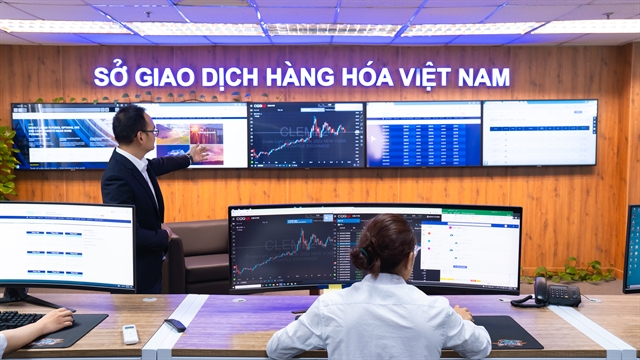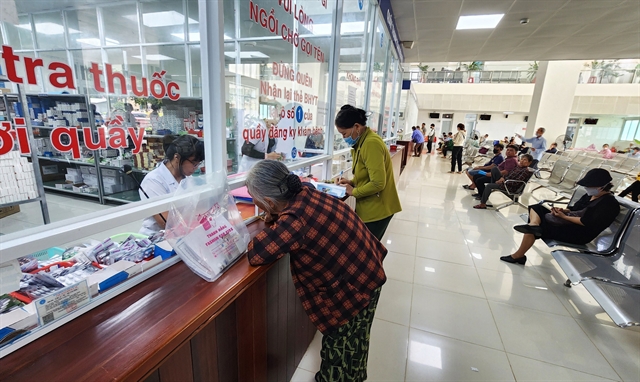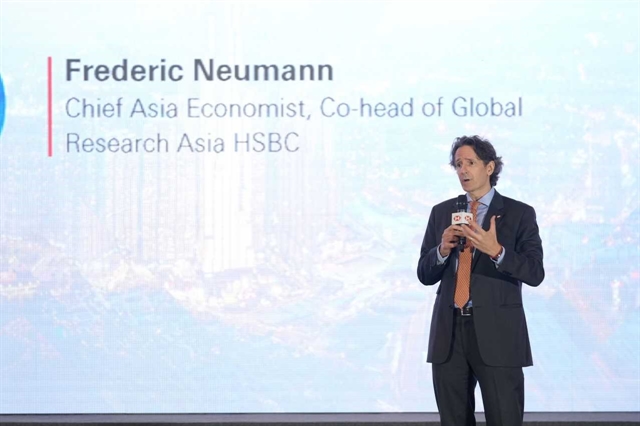 Economy
Economy


|
| Frederic Neumann, HSBC's Chief Economist for Asia-Pacific. — VNS Photo |
HÀ NỘI — Việt Nam is poised to become the fastest-growing economy in ASEAN, with GDP growth forecasted at 7 per cent in 2024, driven primarily by its openness to foreign direct investment (FDI).
This optimistic outlook was shared by Frederic Neumann, HSBC's Chief Economist for Asia-Pacific, during the 'Market Outlook 2024' conference held in Hà Nội on October 15.
HSBC recently revised its growth forecast for Việt Nam, raising it from 6.5 per cent to 7 per cent, the highest among international organisations.
In the first nine months of 2023, Việt Nam attracted nearly US$25 billion in FDI, reflecting an 11.6 per cent increase compared to the same period last year. This influx is seen as crucial for Việt Nam 's continued economic expansion, with Neumann emphasising the importance of maintaining an open stance towards foreign investment while also being selective in priority sectors.
He pointed out that while many countries may offer substantial incentives to attract FDI, Việt Nam 's competitive edge lies in its labour quality, logistics and infrastructure. However, he cautioned that the rapid influx of FDI is putting pressure on Việt Nam's infrastructure, which needs significant improvements. Neumann suggested looking at China’s approach to infrastructure development as a model, advocating for better financial controls and a focus on environmentally friendly investments.
While other countries in the region, like Thailand and Malaysia, have focused their FDI efforts on specific sectors, Neumann believes Việt Nam should also focus on areas that require targeted incentives. He highlighted a potential shift in the Vietnamese economy, where domestic consumption could become a more significant growth driver as global trade cycles cool. Despite challenges in exports, improving consumer confidence and purchasing power could support continued economic growth.
HSBC projects that Việt Nam 's economic scale will increase significantly over the next several years, reinforcing its position as a key player in Southeast Asia.
Foreign Direct Investment (FDI) is indeed flowing into Southeast and South Asia, and while some large projects may go to other countries, Việt Nam should strategically focus on attracting investment in key areas.
Thailand leads the region in attracting Chinese capital, particularly in the electric vehicle sector, which aligns with its automotive industry strengths. Bangladesh specialises in the garment industry, while Indonesia draws FDI related to its natural resources. India's FDI primarily aims at local market production, contrasting with Việt Nam 's focus on export-oriented investment.
Experts note that Việt Nam 's main competitor is Malaysia, particularly in electronics and semiconductors. To remain attractive, Việt Nam should prioritise sectors that drive growth and limit environmentally damaging projects. Balancing environmental standards without being overly restrictive is crucial in a competitive landscape.
Frederic Neumann highlights that HSBC forecasts a robust GDP growth of 6.5 per cent for Việt Nam next year the highest in Southeast Asia, attributing part of this growth to an expected increase in domestic consumption. This shift from reliance on exports to bolstered domestic demand could further strengthen Việt Nam 's economic position.
Consumers in Việt Nam are feeling more optimistic as inflation continues to decline, boosting their purchasing power. An HSBC expert anticipates that consumer confidence will steadily improve over the next 18 months. Additionally, HSBC projects that from 2024 to 2029, the country’s economy will grow by an average of $40 billion annually, which is notable compared to Singapore and Malaysia, but lower than the growth expected in the Philippines and Indonesia.
For context, the General Statistics Office estimates Việt Nam 's GDP at current prices to be around $430 billion in 2023. This combination of factors suggests a potentially positive outlook for the Vietnamese economy. — VNS




